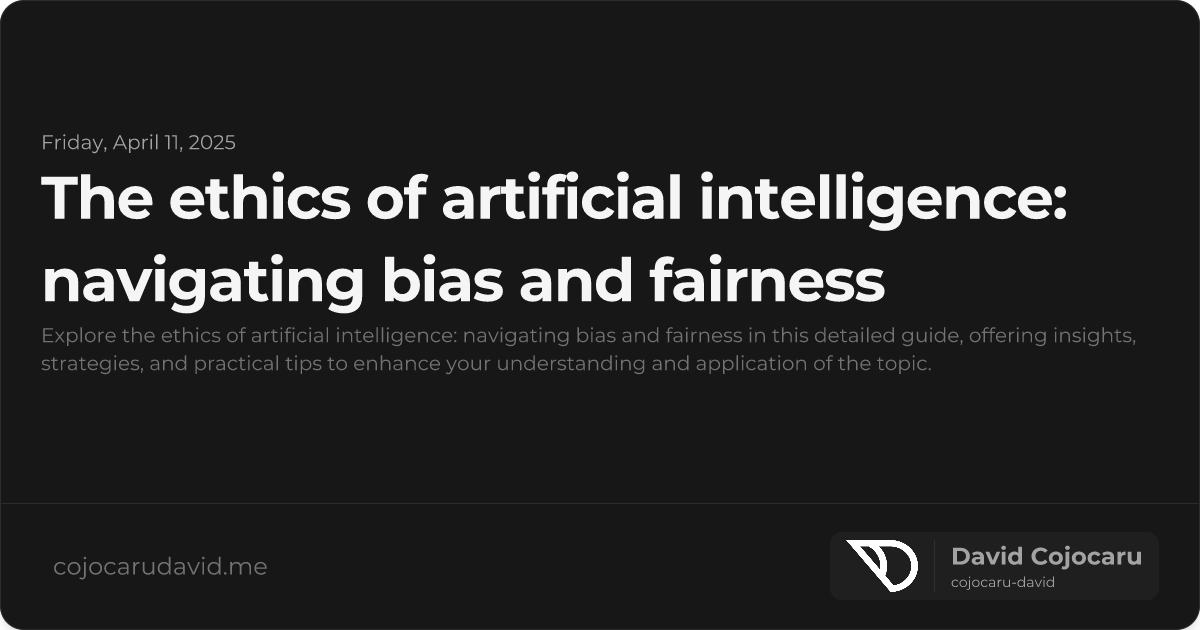The Ethics of Artificial Intelligence: A Guide to Bias and Fairness
Artificial intelligence (AI) is rapidly transforming industries, promising unprecedented advancements in healthcare, finance, and beyond. But with this transformative power comes a critical responsibility: ensuring AI systems are ethical, fair, and unbiased. This post, The Ethics of Artificial Intelligence: A Guide to Bias and Fairness, explores the challenges of AI bias and offers practical strategies for building more equitable AI solutions. As AI increasingly shapes our decisions, understanding and addressing these issues is paramount to building trust and fostering a future where AI benefits everyone.
Understanding AI Bias: Where Does It Come From?
AI bias occurs when machine learning models produce skewed or discriminatory results. This isn’t a matter of AI being inherently malicious; rather, it stems from the data and algorithms used to train these systems. The impact of AI bias can be far-reaching, reinforcing existing inequalities and creating new forms of discrimination.
Common Sources of AI Bias: A Deeper Dive
-
Skewed Training Data: The most common source of bias is imbalanced or unrepresentative training data. If a dataset disproportionately represents certain demographics or perspectives, the AI model will likely reflect those biases in its outputs. Imagine training a facial recognition system primarily on images of one ethnicity – it’s likely to perform poorly on others.
-
Algorithmic Design Flaws: Even with diverse data, the design of the algorithm itself can introduce bias. Models may be designed to prioritize certain features or attributes over others, leading to discriminatory outcomes.
-
Human Bias in Labeling and Development: Human prejudices and biases, whether conscious or unconscious, can creep into AI systems during data labeling, feature selection, and model evaluation. For instance, if data labelers associate certain jobs with specific genders, the AI system might perpetuate those stereotypes.
Example: Facial recognition technology has demonstrably shown higher error rates for women and people of color, highlighting the real-world consequences of biased training data and algorithmic design.
Strategies for Building Fairer AI: A Practical Guide
Creating ethical AI requires a proactive and multifaceted approach. Here are key strategies developers and organizations can implement:
1. Cultivate Diverse and Representative Datasets
The foundation of fair AI is diverse and representative data.
- Gather Diverse Data: Actively seek out data that includes a wide range of demographics, perspectives, and experiences.
- Address Imbalances: Use techniques like oversampling (replicating data points from underrepresented groups) or undersampling (reducing data points from overrepresented groups) to balance your datasets.
2. Implement Bias Detection and Mitigation Tools
Leverage tools and techniques to identify and correct biases in AI models.
- AI Fairness 360 (IBM): An open-source toolkit offering a comprehensive set of metrics and algorithms to detect and mitigate bias.
- What-If Tool (Google): Allows you to visualize and analyze the impact of different features on model predictions, helping you identify potential sources of bias.
- Regular Audits: Conduct regular audits of your AI systems to identify and address emerging biases.
3. Embrace Transparent and Explainable AI (XAI)
Ensure AI models are understandable and provide clear reasoning for their decisions.
- SHAP (SHapley Additive exPlanations): A method for explaining individual predictions by assigning each feature a contribution to the outcome.
- LIME (Local Interpretable Model-Agnostic Explanations): Approximates the behavior of a complex model locally with a simpler, interpretable model.
Ethical AI in Action: Industry Examples
Fairness-focused AI is being implemented across various industries:
- Healthcare: AI can assist in medical diagnosis, but it must be carefully designed and validated to avoid racial, gender, or socioeconomic disparities in treatment recommendations.
- Finance: Loan approval algorithms must be scrutinized to ensure they don’t discriminate against individuals based on protected attributes like race, gender, or religion.
- Hiring: AI-powered recruitment tools should be regularly audited to eliminate gender, ethnic, or other biases that could lead to unfair hiring practices.
The Future of Ethical AI: Collaboration and Regulation
The future of ethical AI hinges on ongoing collaboration between technologists, ethicists, policymakers, and the public. Regulatory frameworks like the EU’s AI Act and ethical guidelines from organizations like IEEE will play a crucial role in shaping responsible AI development.
“AI, at its core, is a reflection of the data it’s trained on. To create ethical AI, we must actively address bias in our data and development processes.”
Prioritizing fairness, accountability, and transparency is not just a technical challenge; it’s a societal imperative. By embracing these principles, we can unlock AI’s immense potential while mitigating its risks and ensuring a future where AI benefits all of humanity. The Ethics of Artificial Intelligence: A Guide to Bias and Fairness is an ongoing conversation, and your participation is crucial.

